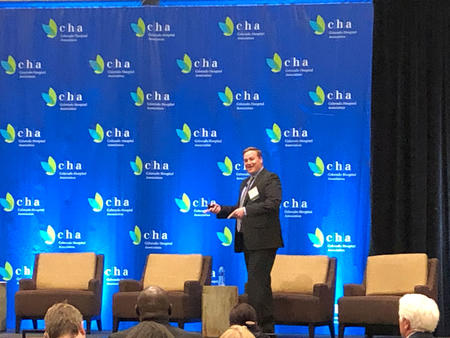Feb. 24, 2020: When it comes to solving the state's opioid crisis, Colorado health care providers and organizations must be willing to embrace change.
That was the takeaway from the third Opioid Safety Summit, hosted by the Colorado Hospital Association (CHA) and Colorado Department of Human Services, Office of Behavioral Health (OBH) on Feb. 11, 2020. The conference brought together more than 400 doctors, nurses, social workers and public health experts to share emerging practices in treating opioid use disorder.
As in most states, opioid misuse is a challenge in Colorado. The overdose rate spiked 179 percent between 2001 and 2015. More than 550 Coloradans died from prescription opioid or heroin overdose in 2017 alone, according to the Colorado Department of Public Health and Environment.
This urgency has prompted health care providers to rethink how they deliver services. Among many proposed solutions, the summit covered three key themes:
Treating opioid use disorder as a medical disease
| OBH Director Werthwein presents during the Summit. Photo courtesy of the Colorado Hospital Association |
Doctors and clinicians are increasingly seeing opioid use disorder as a medical disease-not just a behavioral health issue. Many conference sessions focused on medication-assisted treatment, or MAT. With MAT, doctors and clinicians prescribe one of three FDA-approved medications that interact with the same brain receptors as opioids, helping patients manage addiction safely.
To expand MAT in rural areas, OBH is rolling out six mobile health units-RVs outfitted with health clinics inside. As OBH Director Robert Werthwein explained, a licensed nurse, addictions counselor and a peer recovery coach will staff each unit and consult doctors over a satellite connection, called telehealth. After an initial screening, patients can begin MAT and receive referrals to other community resources, such as therapy and food assistance.
"We want to encourage people to come," said Werthwein. "We want to help them with their fears around stigma. It's about health, which is what we should be saying about addiction anyway."
Medical professionals must expand MAT, too, said CHA advisor Don Stader, MD. Many physicians don't realize they can prescribe buprenorphine and other medicines that help people transition to recovery. To train doctors, CHA recently launched the Colorado MAT website, an all-inclusive resource for emergency department providers to begin transitioning patients with opioid use disorder to MAT. "We have the power to change treatment,” he said, "and we have to take personal responsibility."
Seeking justice for those affected by opioid addiction
Colorado Attorney General Phil Weiser updated attendees on ongoing lawsuits between the state and opioid manufacturers. Weiser's office argues that drug companies intentionally misled patients on opioids" addictive properties, harming individuals and the state broadly.
When the settlement finalizes, Colorado stands to gain tens of millions of dollars that will support opioid use disorder treatment-funds that could free up dollars for other critical program areas, Weiser said. That's especially crucial to serve those involved in Colorado's criminal justice system, who often go through withdrawal when incarcerated.
Finally, Weiser said his office continues to go after bad actors, including a Colorado pharmacist who collected unused opioid prescriptions and sold them on the black market.
Sharing stories of hope
Speakers and attendees shared stories of hope and resilience throughout the summit. Ryan Hampton, a national recovery advocate, spoke powerfully about his journey to overcome addiction. While appropriate medical treatment is paramount, he said, leaders should not overlook the effect of strong community-based programs. Having access to both-peer mentors and excellent care-offers robust support to those working through addiction.
Medical professionals echoed this theme. Dr. Read Pierce, a clinical professor at the University of Colorado Anschutz, walked through coaching techniques for doctors that help patients understand the emotional challenges of their pain and find sustainable ways to manage it. Opioid use disorder affects everyone-medical professionals, patients and their loved ones. By showing vulnerability, Pierce said, doctors can foster more trusting relationships with their patients.
This focus made OBH's Recovery Cards Project, showcased at the conference, a perfect backdrop for the day's conversations. OBH recently launched a line of greeting cards written by and for Coloradans overcoming addiction and the loved ones supporting them. To date, OBH received 4,000 orders for cards and sent 14,000cards to all 50 states. As attendees attested, the Recovery Cards project is already changing the conversation around opioid use disorder and modeling what empathetic care can look like.
Holding ourselves accountable
Though attendees came from diverse backgrounds and areas of expertise, all agreed that it's on us-state government, nonprofits and medical providers-to solve the opioid crisis. The Summit illustrated that by reimagining how we deliver service, and embracing the humanity of our patients, we can put more Coloradans on the road to recovery.

